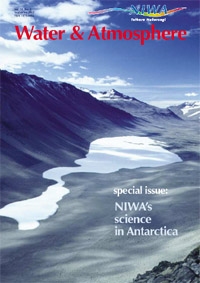
Antarctica and the surrounding Southern Ocean are very special places to humankind and stand at New Zealand’s back door. Antarctica New Zealand is the agency responsible for developing, managing and administering New Zealand’s activities in Antarctica, facilitating research, promoting environmental stewardship, enhancing public awareness and providing logistical support in this vast and unique landscape.
In May 2002, the Government review of New Zealand’s Strategic Interests in Antarctica and the Southern Ocean reaffirmed the Government’s commitment to support high-quality research in Antarctica and the Southern Ocean. The revised statement also confirmed New Zealand’s commitment to “conservation of the intrinsic and wilderness values of Antarctica and the Southern Ocean, for the benefit of the world community and for present and future generations of New Zealanders”.
Reflecting this commitment, Antarctica New Zealand has revised the Antarctic and Southern Ocean Science Strategy to provide a basis for managing and enhancing New Zealand science activities in the Ross Sea region over the next five years (2003–2008). We are also keen to use research to contribute to advancing goals contained in the Government’s Revised Statement of Strategic Interest (2002). The revised Science Strategy was developed through wide consultation with policy makers, funding providers, NGOs and Antarctic and Southern Ocean researchers.
The new Science Strategy is centred on three research themes: Antarctic Physical Environments Research, Southern Ocean Research, and Antarctic Ecosystems Research. A Research Theme Committee working with Antarctica New Zealand’s Science Strategy manager will provide direction and an overview of our research, while the Antarctic Research Committee will continue to evaluate the quality of individual science proposals.
Some of the key science challenges and emerging priorities are:
- Climate Change – an international issue in which New Zealanders work alongside the global community of researchers to understand the drivers and impacts of climate change
- Marine Biodiversity – creating quantitative knowledge of marine communities and a better understanding of how species and ecosystems interrelate.
- Global Ecosystems – An improved understanding of biodiversity, life processes and responses to environmental change.
Antarctica New Zealand looks to the future, supporting quality science, providing sound logistical support and assisting the international collaboration so vital for the continuing success of New Zealand activities in Antarctica.
Nowhere is this vital international collaboration so evident as our new major science projects: the Latitudinal Gradient Project, the ANDRILL drilling project and the Ministry of Fisheries BioRoss project. International Polar Year in 2007/08 will offer all the Treaty countries an opportunity to highlight internationally collaborative research in both the Antarctic and Arctic environments.
We are particularly proud of the close working relationship that Antarctica New Zealand enjoys with NIWA and this publication reflects the success of these important science projects in Antarctica and the Southern Ocean.
Lou Sanson CEO, Antarctica New Zealand
